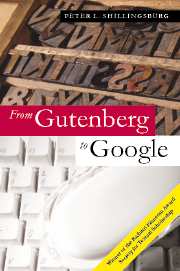Book contents
- Frontmatter
- Contents
- Introduction
- 1 Manuscript, book, and text in the twenty-first century
- 2 Complexity, endurance, accessibility, beauty, sophistication, and scholarship
- 3 Script act theory
- 4 An electronic infrastructure for representing script acts
- 5 Victorian fiction: shapes shaping reading
- 6 The dank cellar of electronic texts
- 7 Negotiating conflicting aims in textual scholarship
- 8 Hagiolatry, cultural engineering, monument building, and other functions of scholarly editing
- 9 The aesthetic object: “the subject of our mirth”
- 10 Ignorance in literary studies
- Bibliography
- Index
7 - Negotiating conflicting aims in textual scholarship
Published online by Cambridge University Press: 23 December 2009
- Frontmatter
- Contents
- Introduction
- 1 Manuscript, book, and text in the twenty-first century
- 2 Complexity, endurance, accessibility, beauty, sophistication, and scholarship
- 3 Script act theory
- 4 An electronic infrastructure for representing script acts
- 5 Victorian fiction: shapes shaping reading
- 6 The dank cellar of electronic texts
- 7 Negotiating conflicting aims in textual scholarship
- 8 Hagiolatry, cultural engineering, monument building, and other functions of scholarly editing
- 9 The aesthetic object: “the subject of our mirth”
- 10 Ignorance in literary studies
- Bibliography
- Index
Summary
Two roads diverged in a yellow wood
Robert Frost, “The Road Not Taken” (1920)The Cottage which was named the Evening Star
Is gone – the ploughshare has been through the ground
On which it stood; great changes have been wrought
In all the neighbourhood: – yet the oak is left
That grew beside their door; and the remains
Of the unfinished Sheep-fold may be seen
Beside the boisterous brook of Green-head Ghyll.
William Wordsworth, “Michael” (1800)This chapter is about losses. It is written in the context of positive hopes and claims about books. Book collecting and archive building form a part of its context. Special collections and rare book collections in libraries and collections formed by book lovers anywhere, for example, accentuate the positive when they focus on what they own and what they have preserved, but it is inevitable that the subject eventually turns to what they do not own and what was lost before it could be saved. Literary criticism forms another part of the context, accentuating the positive by focusing on insights and on the discovery of new or neglected talent, but it is inevitable that the subject eventually turns to faded insights, outmoded critical fads, or the rejection of formerly held ideas in the light, or should one say the flash, of new ones. And what is said here about books and book editions applies equally to electronic scholarly editions and to the electronic knowledge sites I so much hope will be developed.
- Type
- Chapter
- Information
- From Gutenberg to GoogleElectronic Representations of Literary Texts, pp. 151 - 160Publisher: Cambridge University PressPrint publication year: 2006



